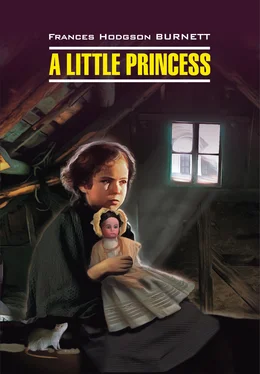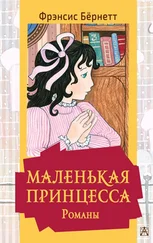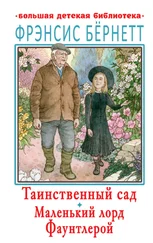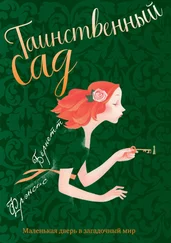“My name’s Ermengarde St. John,” she answered.
“Mine is Sara Crewe,” said Sara. “Yours is very pretty. It sounds like a story book.”
“Do you like it?” fluttered Ermengarde. “I – I like yours.”
Miss St. John’s chief trouble in life was that she had a clever father. Sometimes this seemed to her a dreadful calamity. If you have a father who knows everything, who speaks seven or eight languages, and has thousands of volumes which he has apparently learned by heart, he frequently expects you to be familiar with the contents of your lesson books at least; and it is not improbable that he will feel you ought to be able to remember a few incidents of history and to write a French exercise. Ermengarde was a severe trial to Mr. St. John. He could not understand how a child of his could be a notably and unmistakably dull creature who never shone in anything.
“Good heavens!” he had said more than once, as he stared at her, “there are times when I think she is as stupid as her Aunt Eliza!”
If her Aunt Eliza had been slow to learn and quick to forget a thing entirely when she had learned it, Ermengarde was strikingly like her. She was the monumental dunce of the school, and it could not be denied.
“She must be MADE to learn,” her father said to Miss Minchin.
Consequently Ermengarde spent the greater part of her life in disgrace or in tears. She learned things and forgot them; or, if she remembered them, she did not understand them. So it was natural that, having made Sara’s acquaintance, she should sit and stare at her with profound admiration.
“You can speak French, can’t you?” she said respectfully.
Sara got on to the window-seat, which was a big, deep one, and, tucking up her feet, sat with her hands clasped round her knees.
“I can speak it because I have heard it all my life,” she answered. “You could speak it if you had always heard it.”
“Oh, no, I couldn’t,” said Ermengarde. “I NEVER could speak it!”
“Why?” inquired Sara, curiously.
Ermengarde shook her head so that the pigtail wobbled.
“You heard me just now,” she said. “I’m always like that. I can’t SAY the words. They’re so queer.”
She paused a moment, and then added with a touch of awe in her voice, “You are CLEVER, aren’t you?”
Sara looked out of the window into the dingy square, where the sparrows were hopping and twittering on the wet, iron railings and the sooty branches of the trees. She reflected a few moments. She had heard it said very often that she was “clever,” and she wondered if she was – and IF she was, how it had happened.
“I don’t know,” she said. “I can’t tell.” Then, seeing a mournful look on the round, chubby face, she gave a little laugh and changed the subject.
“Would you like to see Emily?” she inquired.
“Who is Emily?” Ermengarde asked, just as Miss Minchin had done.
“Come up to my room and see,” said Sara, holding out her hand.
They jumped down from the window-seat together, and went upstairs.
“Is it true,” Ermengarde whispered, as they went through the hall – “is it true that you have a playroom all to yourself?”
“Yes,” Sara answered. “Papa asked Miss Minchin to let me have one, because – well, it was because when I play I make up stories and tell them to myself, and I don’t like people to hear me. It spoils it if I think people listen.”
They had reached the passage leading to Sara’s room by this time, and Ermengarde stopped short, staring, and quite losing her breath.
“You MAKE up stories!” she gasped. “Can you do that – as well as speak French? CAN you?”
Sara looked at her in simple surprise. [60] Sara looked at her in a simple surprise. – Сара посмотрела на нее в полном изумлении.
“Why, anyone can make up things,” she said. “Have you never tried?”
She put her hand warningly on Ermengarde’s.
“Let us go very quietly to the door,” she whispered, “and then I will open it quite suddenly; perhaps we may catch her.”
She was half laughing, but there was a touch of mysterious hope in her eyes which fascinated Ermengarde, though she had not the remotest idea [61] she had not the remotest idea – она не имела ни малейшего представления
what it meant, or whom it was she wanted to “catch,” or why she wanted to catch her. Whatsoever she meant, Ermengarde was sure it was something delightfully exciting. So, quite thrilled with expectation, she followed her on tiptoe along the passage. They made not the least noise until they reached the door. Then Sara suddenly turned the handle, and threw it wide open [62] threw it wide open – распахнула ее
. Its opening revealed the room quite neat and quiet, a fire gently burning in the grate, and a wonderful doll sitting in a chair by it, apparently reading a book.
“Oh, she got back to her seat before we could see her!” Sara explained. “Of course they always do. They are as quick as lightning.”
Ermengarde looked from her to the doll and back again.
“Can she – walk?” she asked breathlessly.
“Yes,” answered Sara. “At least I believe she can. At least I PRETEND I believe she can. And that makes it seem as if it were true. Have you never pretended things?”
“No,” said Ermengarde. “Never. I – tell me about it.”
She was so bewitched by this odd, new companion that she actually stared at Sara instead of at Emily – notwithstanding that Emily was the most attractive doll person she had ever seen.
“Let us sit down,” said Sara, “and I will tell you. It’s so easy that when you begin you can’t stop. You just go on and on doing it always. And it’s beautiful. Emily, you must listen. This is Ermengarde St. John, Emily. Ermengarde, this is Emily. Would you like to hold her?”
“Oh, may I?” said Ermengarde. “May I, really? She is beautiful!” And Emily was put into her arms.
Never in her dull, short life had Miss St. John dreamed of such an hour as the one she spent with the queer new pupil before they heard the lunch-bell ring and were obliged to go downstairs.
Sara sat upon the hearth-rug and told her strange things. She sat rather huddled up, and her green eyes shone and her cheeks flushed. She told stories of the voyage, and stories of India; but what fascinated Ermengarde the most was her fancy about the dolls [63] her fancy about the dolls – ее интерес и истории про кукол
who walked and talked, and who could do anything they chose when the human beings were out of the room, but who must keep their powers a secret and so flew back to their places “like lightning” when people returned to the room.
“WE couldn’t do it,” said Sara, seriously. “You see, it’s a kind of magic.”
Once, when she was relating the story of the search for Emily, Ermengarde saw her face suddenly change. A cloud seemed to pass over it and put out the light in her shining eyes. She drew her breath in [64] she drew her breath in – она глубоко вдохнула
so sharply that it made a funny, sad little sound, and then she shut her lips and held them tightly closed, as if she was determined either to do or NOT to do something. Ermengarde had an idea that if she had been like any other little girl, she might have suddenly burst out sobbing and crying. But she did not.
“Have you a – a pain?” Ermengarde ventured.
“Yes,” Sara answered, after a moment’s silence. “But it is not in my body.” Then she added something in a low voice which she tried to keep quite steady, and it was this: “Do you love your father more than anything else in all the whole world?”
Читать дальше












